A few years ago I was invited to make a film about the Apostle Paul. More precisely, not about the Apostle Paul himself, but about the creation and installment of a monument to him in the village of Kawkab near Damascus, where the heavens were opened to Saul and he saw Christ.
I agreed, of course. First, it was interesting to have a face-to-face look at Syria, a country that is enigmatic in many ways, one that for some reason we do not talk about much. Second, Syria is the cradle of Christianity. Any involvement in living Christian history not only enriches one with new knowledge, but also appreciably strengthens one’s faith—and this is something that every Christian needs.
The cameraman G. Belyaev and I obtained our visas and flew there.
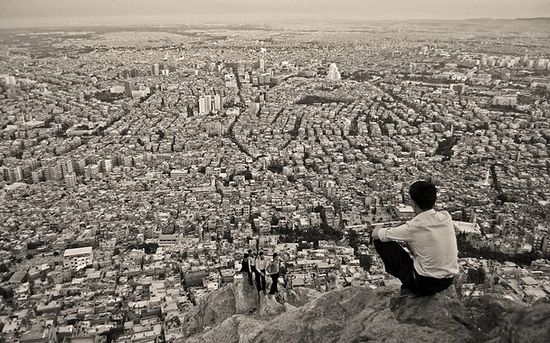 |
| Damascus. |
We saw a benevolent and open country in which hoary antiquity and modern civilization were intricately intertwined, where different religions and customs peacefully coexisted. On the streets of Damascus one could encounter women dressed in black burkas from head to toe and, right next to them, modern girls in jeans and uncovered heads. No one pointed fingers at one another or accused them of believing, living, and dressing in the wrong way.
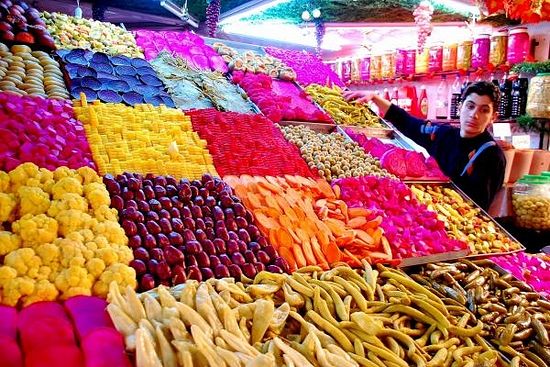 |
Here everything was like it was 3,000 years ago. Empires rose and disappeared from the face of the earth, conquerors came from somewhere in the desert like locusts, sweeping away everything on their path, and then dissolving somewhere in the sands. But the Syrian peasant, having harvested his crop, carried it by donkey to the market in Damascus and waited patiently under the merciless sun for a buyer. Human glory quickly passes, riches obtained from military campaigns quickly melt away, but man is always in need of bread…
History is alive
The enormous number of antiquities concentrated in Syria’s rather small territory astonished us. Here is the cave near Damascus where, according to tradition, Cain killed Abel. The mountain could not endure such an evil deed and cried out with a great voice. It is not known exactly whether this really happened, but the cave does indeed have the form of a wide-open mouth: there is a tongue, teeth, and larynx. There are still markings pointing out various places: here the Forefather Abraham prayed, and here stood the Great-Martyr George. Everything is alive…
Many places associated with the Holy Apostle Paul have been preserved. This means, in the first place, ancient Kawkab, where Christ appeared to Saul. Here stands an Orthodox church of a very original form, in the shape of a shell, or something like that, built with the means of our Patriarch Alexy I in the mid-1950s.
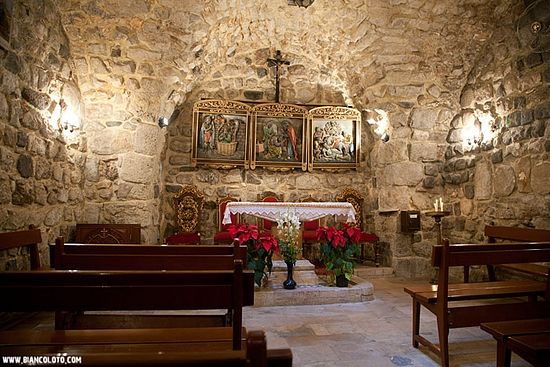 |
History here is alive and its breath is felt everywhere. This is true of the magnificent Umayyad Mosque, which somewhere in the seventh century was a house of prayer for over 100 years for Christians and Muslims simultaneously (a spot where John the Forerunner’s head had been buried is located here). This is also true of the ruins of Palmyra, of the fortress of the Knights Templar Chevalier, and of the beautifully preserved city of the Sumerians, which is 3,000 years old, and of a multitude of other ancient monuments.
“It’s strange that all this hasn’t yet been destroyed and looted,” a cameraman said to me—and I caught myself entertaining similar thoughts. The war in neighboring Iraq had just ended…
Ma’loula
The most ancient Christian monastery on earth is located in this town. It was founded back in the first century by St. Thekla the Equal-to-the-Apostles, a disciple of the Apostle Paul. According to tradition, when she was escaping from persecutors a mountain stood in her way that was impossible to bypass. Then Thekla prayed to God and the mountain parted before her. All pilgrims who visit the monastery are supposed to walk along this narrow gorge, which still exists.
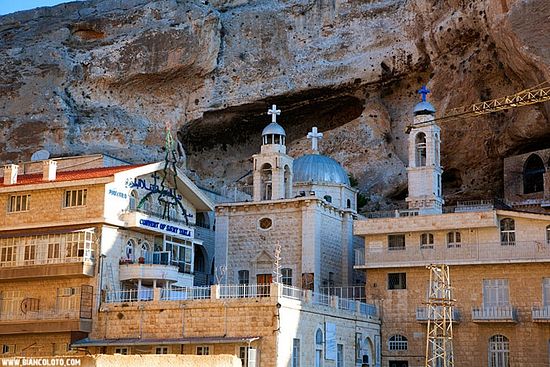 |
| The Monastery of St. Thecla, Ma'loula. Сирия. Photo: www.biancoloto.com |
Ma’loula is the only place in the world where the inhabitants speak Aramaic, the language of Jesus. Until the 1970s they celebrated the divine services in this dialect. We heard a recording of it in the archive—it is amazing!
Not far from here is the Saydnaya Convent, which was founded more than 1,500 years ago by the Emperor Justinian. He hunted deer here and saw the Theotokos standing on the mountaintop, who ordered him to found a monastery for pure virgins on this place. This event was forever imprinted in the convent’s name: “Saydnaya” means “deer hunting” in Aramaic.
Patriarch Ignatius
He was an amazing man. He understood Russian fairly well, because he had studied at the St. Serge Institute in Paris at the end of the 1930s. He replied to our questions almost immediately, without waiting for a translation. He spoke very slowly, choosing his words deliberately. This was not only because of his advanced age, but also because he had spent his entire life in a Muslim environment, where every careless word could cause a real storm.
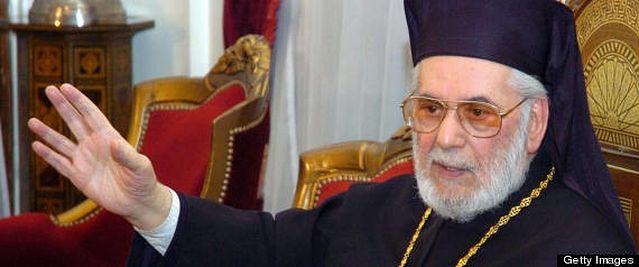 |
Now, watching the carnage in Syria, I understand what His Beatitude the Patriarch was talking about.
He said that in his country all religions live in peace and that on Pascha there are even more Muslims than Christians in his church…
Sheikh Ahmad Hassoun
We spoke with him when he was the sheikh of Aleppo, but now he is the head of all Syrian Sunnis.
I cite his words as they appeared in our film, without changing anything. On first sight, it might seem that these thoughts stand in direct contradiction to what is going on now in Syria. But this is not the case. I am convinced that the war was brought here from outside in order to destroy a unique world that does not fit into any scheme, either Western or Eastern.
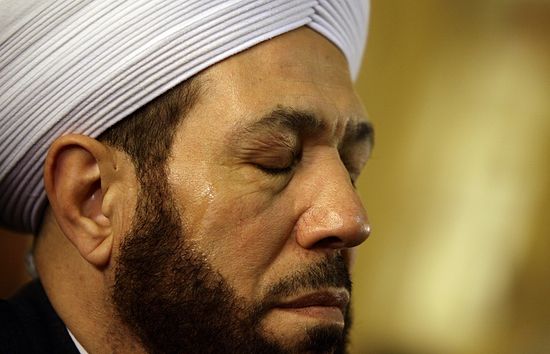 |
“We are a nation that does not know hatred on religious grounds. We do not know the destruction of mosque or church, so our stones have remained witnesses for millennia. We are all united in our common forefather Adam: Russians, Arabs, Europeans, and Africans. We have different skin colors, depending on the countries in which we live, but we have a common heart: a bodily heart from Adam, and a spiritual heart from Abraham. The heavenly soul is open to all people, like the sun. Such is Syria, which radiates with heavenly messages for the entire world. In these messages are only love and reason; there is no clash of civilizations or conflict of religion in them. Therefore we always say: lovers of argument have only strife, but lovers of beauty never have it. God is absolute Beauty, so why should we have strife for it? Strife is an attribute of science, because science is the dialectic of the mind, but it is inconceivable for minds and civilizations to have strife because of God. The name of God radiates love, for which reason we say: God is love.”
The Syrian Likhachov
For our film we really needed someone who could lead us through the complex maze of Syrian history, and we found such a person. This was the historian Mhammad Mhafel, whom our Russian-speaking friends in Syria introduced simply as: “This is our Likhachov.”[1] And, indeed, he could hold forth on any topic easily and without preparation: relating the story of the Apostle Paul’s conversion, telling about the Crusades, or talking about the actions of Saladin.[2]
He told us many interesting things about the world of Islam. This, for example: “Muslims do not have the right to convert Christians or Jews to their faith, because they are already consecrated to the One God. But if they encounter a pagan, then they should convert him. Similarly, Muslims do not have the right to destroy synagogues or Christian churches, because these walls are consecrated to the One God. Whoever lifts his hand against consecrated stones is not a Muslim.” Thus spoke the honorable Mhammad Mhafel, doctor of history, and I have no reason to doubt him.
To our observation that in Christian history there have been many examples of Hagarenes not only destroying churches, but also depriving Christians of life, he replied that there are many currents within Islam, among which are some fairly barbaric teachings that are, unfortunately, now dominant in the Islamic world. But in Syria there are many enlightened scholars who teach an entirely different kind of Islam. Their goal is to impart this teaching to all Islamic peoples.
Premonitions of strife
People ask me: were there really no premonitions in the air of Damascus of the carnage now unfolding in Syria? I can honestly answer: No. There was a clear feeling of amiability, calm, and Eastern unhurriedness in everything.
Of course, Syrian society is completely heterogeneous. Just among Christians there are also Maronites, Catholics, Copts, Gregorians, Uniates, and Protestants. Muslims have two main communities: Sunnis and Shiites, but there are also Alawites, Druzes, and other currents. Of course, for many centuries many conflicts and enmities have accumulated. As they say, just strike a match… Well, a match was struck.
I do not by any means wish to defend the current Syrian regime. It could be that they are totalitarian. But, in principle, there can be no European (or other) democracy in the East, of this I am convinced, because this is a special civilization that is very different from our own. Any regime in the East—be it of a sheikh, sultan, king, or president—is bound to be harsh and autocratic. Otherwise there will be chaos and destruction, as the past several years in Arab countries have shown us—and, even before that, in Lebanon, where the war has been going on for forty years already.
God forbid that events develop in this way in Syria! Then we would lose not only human lives, but also an enormous number of monuments belonging to the very cradle of human history.
God forbid!

